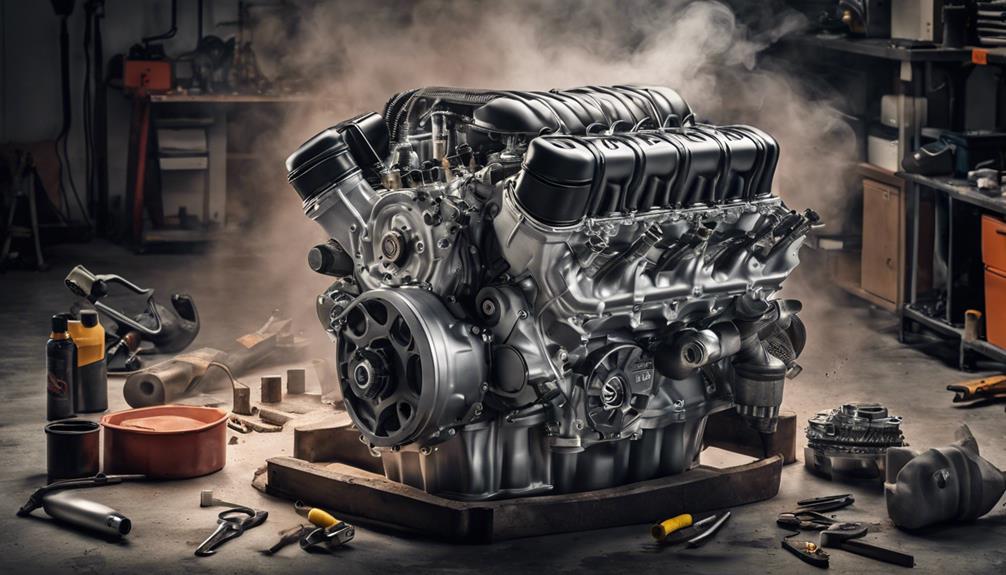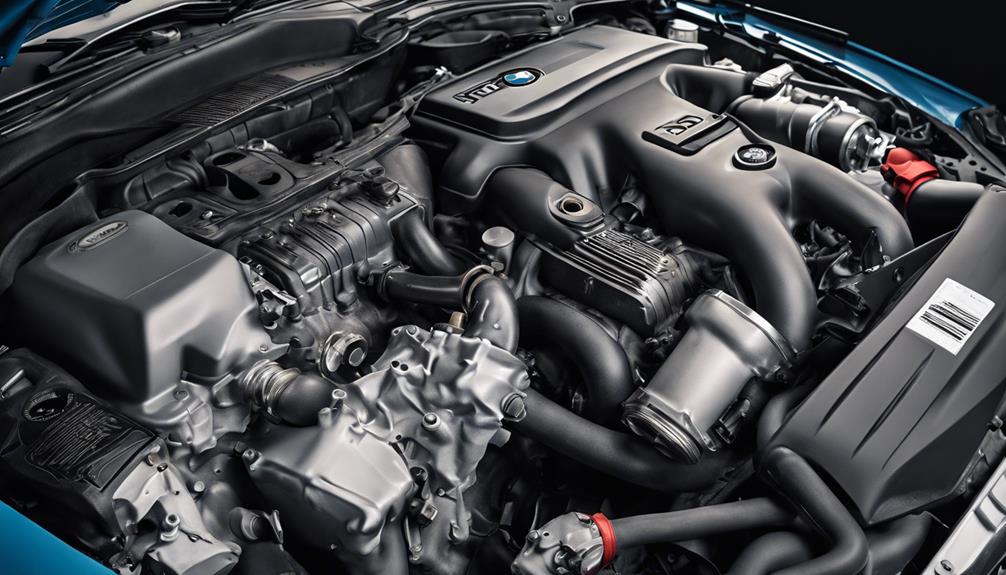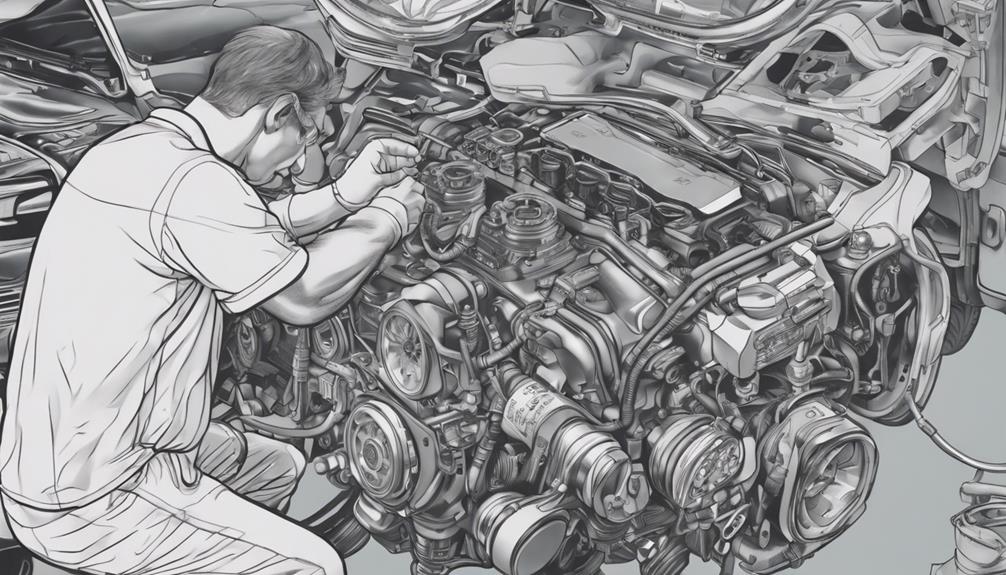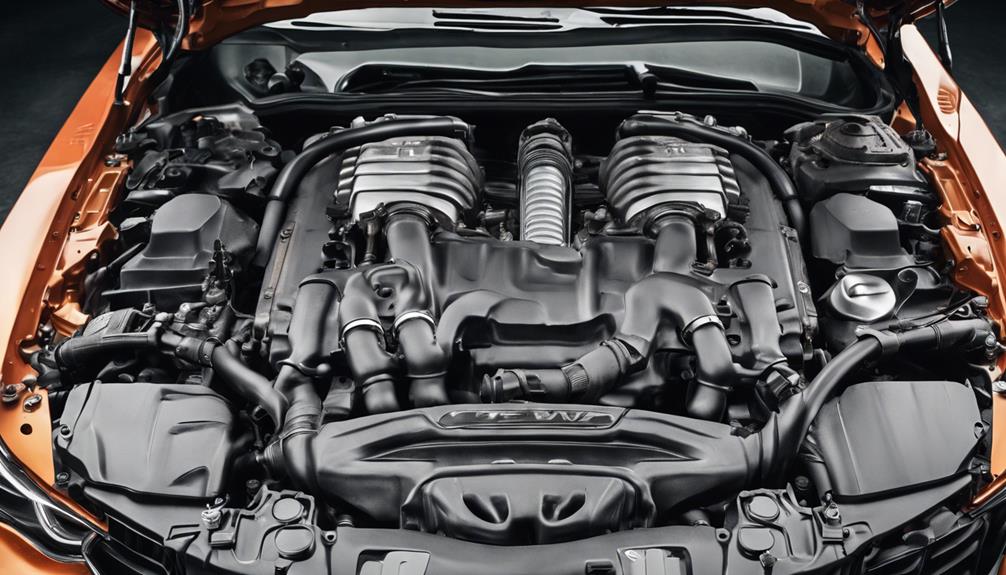When evaluating the reliability of the BMW X5, it is crucial to consider its 2.0 out of 5.0 reliability rating, positioning it 13th among luxury full-size SUVs. Possible issues such as engine performance concerns, electrical system problems, engine stalls, oil leaks, and transmission issues may give you pause. Digging deeper into its track record could unveil more insights.
Key Takeaways
- BMW X5 has a reliability rating of 2.0 out of 5.0.
- Common issues include engine performance and electrical system problems.
- Timely diagnostics and repairs are crucial for maintaining reliability.
- Newer models like the 2017 and 2021 show improved reliability.
- BMW X5 future reliability prospects are positive with proactive issue resolution.
BMW X5 Reliability Overview

When assessing the dependability of the BMW X5, one quickly discovers a mixed bag of feedback and data points that paint a detailed picture of its performance in various areas. The BMW X5's reliability rating of 2.0 out of 5.0 positions it as the 13th out of 19 luxury full-size SUVs, indicating a less-than-stellar track record. With an average annual repair cost of $1,166 and repair shop visits averaging 0.8 times per year, owning a BMW X5 might require a bit more maintenance attention than anticipated. The 17% probability of facing a major repair further adds to the apprehension potential owners might feel.
Trouble spots identified by owners include in-car electronics, exhaust system issues, major engine components, and transmission troubles. These common issues suggest that while the BMW X5 offers a luxurious driving experience, there are underlying reliability concerns that need to be considered. As you weigh your options and desire a sense of belonging with a reliable vehicle, understanding the BMW X5's mixed reliability indicators becomes essential for making an informed decision.
Common BMW X5 Issues
You may want to pay attention to engine performance concerns and electrical system problems in your BMW X5. These issues can lead to engine stalls, interior leaks, transmission malfunctions, and oil leakage, which could impact the overall reliability of your vehicle.
Keeping an eye on these common BMW X5 problems will help you address any potential issues promptly and guarantee the longevity of your car.
Engine Performance Concerns
Engine performance concerns plague the BMW X5, manifesting in common issues like engine stalls and oil leaks that can greatly impact its reliability and drivability. Here are some key points to take into account:
- Engine Stalls: BMW X5 owners often report instances where the engine unexpectedly shuts off, posing safety risks and inconvenience.
- Oil Leaks: Leakage of oil in the BMW X5 is a prevalent issue that not only leads to environmental concerns but also affects engine lubrication and performance.
- Transmission Problems: Issues with the transmission can exacerbate engine performance problems, creating a domino effect on the vehicle's functionality.
- Diagnostic and Repairs: Resolving engine performance concerns in the BMW X5 requires thorough diagnostics and timely repairs to make sure continued reliability and performance.
Electrical System Problems
Amidst the array of challenges faced by BMW X5 owners, the electrical system problems stand out as a persistent issue impacting various important components of the vehicle.
The BMW X5 is no stranger to common electrical system trouble spots, with issues ranging from the infotainment system to rear entertainment, cameras, and the head-up display. Owners have voiced concerns over confusing electronics, hardware failures, and lighting malfunctions that can plague the X5's electrical system.
Specific problems like Apple CarPlay glitches and telematics control box failure have been highlighted by BMW X5 drivers. Importantly, these electrical issues can lead to dead batteries, often tied to unspecified exhaust problems.
Keeping a keen eye on the in-car electronics is significant to prevent malfunctions and failures in the BMW X5's electrical system.
BMW X5 Model Year Analysis
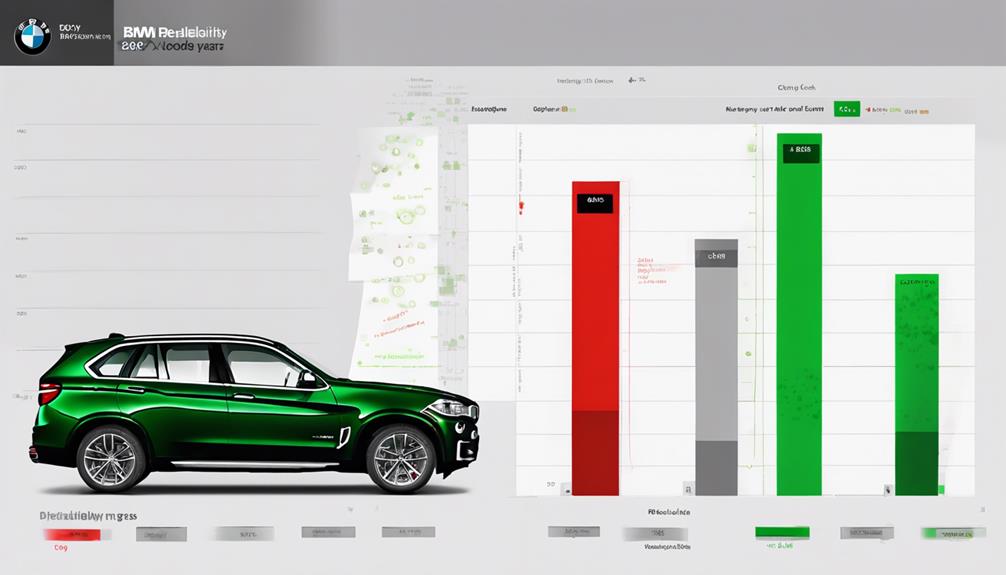
When analyzing BMW X5 model years, you'll find a spectrum of reliability performance. From the 2008 and 2014 models plagued with water leaks to the 2017 and 2021 models boasting exceptional ratings, each year showcases unique strengths and weaknesses.
Model Year Comparison
In the domain of BMW X5 model year analysis, delving into specific years reveals a tapestry of reliability nuances and potential pitfalls. When comparing model years, consider the following:
- 2008 and 2009: Avoid due to water leaks and coolant pump failure issues.
- 2012 and 2013: Caution warranted for body integrity problems.
- 2014: Exercise care as minor issues like oil leaks and brake light problems are reported.
- 2016, 2017, and 2021: Recommended for their reliability, minimal reported issues, and perfect reliability ratings.
Each year brings its own set of challenges and strengths, contributing to the overall ownership experience of the BMW X5.
Reliability Ratings Analysis
Investigating the BMW X5's reliability ratings reveals a terrain of insights and considerations crucial for informed decision-making. According to Consumer Reports, the BMW X5 holds a reliability rating of 2.0 out of 5.0, placing it 13th among luxury fullsize SUVs. Owners report trouble spots such as in-car electronics, exhaust, major engine, transmission, and drive system issues.
The average annual repair cost for the X5 stands at $1,166, with visits to the repair shop occurring 0.8 times per year. Additionally, there's a 17% probability of facing a major repair, potentially leading to significant repair costs.
The 2022 model year was subject to a recall by the NHTSA, pointing out common trouble areas. These insights shed light on the X5's reliability landscape, aiding in decision-making regarding repair costs and potential issues.
BMW X5 Performance and Longevity
To truly comprehend the BMW X5's performance and longevity, explore its engine capabilities and durability. When it comes to the BMW X5, performance and longevity are key factors to mull over. Here are some insights to aid you in understanding its capabilities better:
- Engine Power: The BMW X5 offers a range of potent engine options, including turbocharged six-cylinder and V8 engines, providing impressive acceleration and performance on the road.
- Handling and Dynamics: This luxury SUV is known for its precise handling and agility, making it a joy to drive around corners and on various terrains.
- Longevity: While the BMW X5 boasts strong performance, its longevity can be influenced by the need for repairs, as reported by owners who face an average annual repair cost of $1,166.
- Durability: Despite its performance prowess, the BMW X5 may require frequent visits to the repair shop, with a 17% likelihood of facing major repair issues, impacting overall ownership costs.
Considering these aspects can help you make an informed judgment about the BMW X5's performance and longevity.
BMW X5 Maintenance Tips
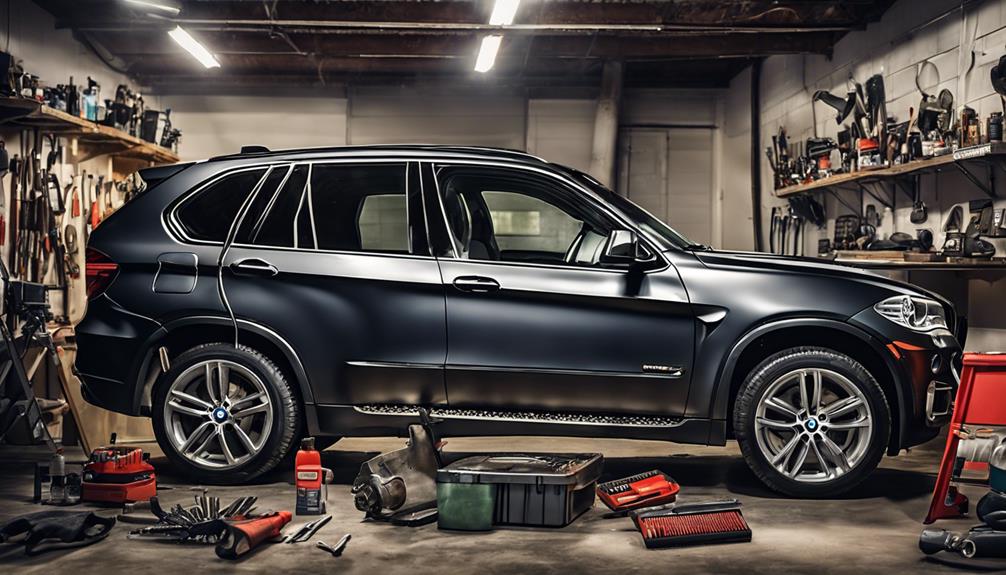
To maintain the reliability of your BMW X5, adhere to regular service intervals, opt for quality replacement parts, and schedule professional mechanic inspections. Keeping up with these maintenance tips can help prevent costly breakdowns and guarantee your X5 runs smoothly for years to come.
Don't overlook the significance of these simple yet effective practices in preserving the performance and longevity of your vehicle.
Regular Service Intervals
For peak performance and longevity of your BMW X5, following the suggested service intervals, such as oil changes, brake inspections, fluid top-ups, and tire rotations, is crucial. Keeping up with regular maintenance not only guarantees your X5 runs smoothly but also helps prevent costly repairs down the road.
- Service Frequency: BMW recommends servicing your X5 every 10,000 miles or at least once a year.
- Maintenance Tasks: Regular service intervals for the BMW X5 include oil changes, brake inspections, fluid top-ups, and tire rotations.
- Benefits: Following the manufacturer's recommended service schedule helps prevent costly repairs and ensures longevity of your X5.
- Consequences of Neglect: Neglecting regular maintenance can lead to engine issues, brake problems, and decreased fuel efficiency in your BMW X5.
Quality Replacement Parts
When maintaining your BMW X5, guaranteeing the use of quality replacement parts is crucial for top performance and longevity. Genuine OEM parts are highly recommended for BMW X5 maintenance to ensure compatibility and reliability. Opting for high-quality replacement parts during repairs can help in preventing future issues and preserving the vehicle's value. Unlike non-genuine or aftermarket parts, OEM parts meet stringent quality standards specific to BMW X5 maintenance. Consulting with a certified BMW technician can provide valuable insights into selecting the best replacement parts tailored to your BMW X5, ensuring both reliability and peak performance.
| Benefits of Quality Replacement Parts |
|---|
| Guarantees peak performance |
| Extends the longevity of the vehicle |
| Prevents future maintenance issues |
Professional Mechanic Inspections
Ensuring your BMW X5's peak performance and longevity involves including professional mechanic inspections in your maintenance plan, allowing for early identification of potential issues and ensuring excellent reliability.
When opting for professional mechanic inspections for your BMW X5, consider the following:
- Thorough checks of the engine, transmission, suspension, brakes, and electrical systems are conducted.
- Mechanics assess the overall condition of the vehicle, including signs of wear and any previous accident damage.
- Hidden issues not easily visible to the untrained eye may be revealed, providing peace of mind for buyers.
- Investing in a professional inspection can save you money in the long run by preventing unexpected repairs and ensuring the vehicle's reliability.
BMW X5 Owner Satisfaction Ratings

With varying owner satisfaction ratings among different model years, the BMW X5 showcases a spectrum of experiences that can influence buyers' decisions. Newer BMW X5 models generally receive higher satisfaction ratings due to improved reliability, performance, comfort, and features. These factors play a significant role in shaping owner satisfaction levels.
However, older models may have more reported issues, such as in-car electronics malfunctions, engine problems, and transmission issues, leading to lower satisfaction among owners. Understanding these ratings can provide valuable insights for potential buyers considering a BMW X5 purchase.
BMW X5 Repair Costs Breakdown
Exploring the domain of BMW X5 ownership involves comprehending the breakdown of repair costs to evaluate the vehicle's overall reliability. When it comes to BMW X5 repair costs, here's what you need to know:
- Average Annual Repair Cost: Owners can expect to pay around $1,166 per year for repairs, as reported by RepairPal.
- Reliability Ranking: The BMW X5 holds the 13th spot out of 19 luxury full-size SUVs for reliability, scoring 2.0 out of 5.0.
- Maintenance Visits: On average, BMW X5 owners make 0.8 visits to repair shops per year for maintenance purposes.
- Probability of Major Repairs: Historical data indicates that there's a 17% chance of encountering a major repair issue with the BMW X5.
Understanding these cost breakdowns and repair frequencies is essential in gauging the overall reliability of owning a BMW X5. Stay informed to make well-rounded decisions regarding maintenance and budgeting for your luxury SUV.
BMW X5 Reliability Compared

Comparing the reliability of the BMW X5 to its luxury full-size SUV counterparts reveals insights into the vehicle's maintenance demands and potential repair costs. When stacked against other vehicles within its class, the BMW X5's reliability rating of 2.0 out of 5.0 positions it as the 13th most reliable out of 19 luxury full-size SUVs. While this rating suggests average reliability, owners report an annual repair cost of $1,166 and 0.8 visits to the repair shop per year, highlighting potential financial implications. The probability of facing major repairs stands at 17%, indicating a moderate likelihood of significant issues arising. To gain a clearer perspective, the table below offers a direct comparison with other luxury full-size SUVs regarding reliability and potential repair costs.
| Vehicle | Reliability Rating | Average Annual Repair Cost | Repair Shop Visits per Year | Probability of Major Repairs |
|---|---|---|---|---|
| BMW X5 | 2.0 | $1,166 | 0.8 | 17% |
| Audi Q7 | 3.5 | $1,032 | 0.6 | 14% |
| Mercedes GLE | 2.5 | $1,215 | 0.9 | 19% |
| Volvo XC90 | 3.0 | $998 | 0.7 | 15% |
| Lexus RX | 4.0 | $890 | 0.5 | 12% |
BMW X5 Resale Value Considerations
Consider the BMW X5's resale value by examining factors like age, mileage, condition, and market demand to make informed decisions about maximizing your investment. When it comes to selling your BMW X5, understanding market trends and taking strategic steps can have a substantial impact on the resale value. Here are several key considerations to keep in mind:
- Age: Newer BMW X5 models generally retain higher resale values due to their updated features and technologies.
- Mileage: Lower mileage vehicles tend to command higher resale prices, as they're perceived as having less wear and tear.
- Condition: Maintaining your BMW X5 in excellent condition, both mechanically and aesthetically, can help preserve its resale value.
- Market Demand: Researching current market trends and demand for BMW X5 vehicles can guide you in setting a competitive resale price.
BMW X5 Future Reliability Prospects

Future reliability prospects for the BMW X5 model are expected to continue the trend of high performance and solid build quality, based on past models' track record. Looking at the BMW Forums Archive, it's evident that BMW has been proactive in addressing potential issues.
The 2022 model's one NHTSA recall demonstrates the brand's dedication to safety and quality. While the 2024 models are still limited, insights from 2022 owners reveal common trouble spots such as in-car electronics, exhaust systems, major engine components, and transmissions. These owner-reported trouble spots serve as warning lights for potential future concerns.
Despite these areas of focus, the overall reliability of the 2024 BMW X5 is anticipated to be strong. With reliability scores derived from real-world owner experiences, BMW appears committed to maintaining and improving the X5's reputation for dependability. As BMW continues to refine its models, future iterations of the X5 are likely to uphold the brand's legacy of quality craftsmanship and performance.
Frequently Asked Questions
Are BMW X5 Expensive to Maintain?
Maintaining a BMW X5 can be pricey, with an annual repair cost averaging $1,166 and a 17% chance of a major repair. Despite the moderate maintenance needs, expect expenses that reflect the luxury SUV status.
Which Year BMW X5 Is the Most Reliable?
For the most reliable BMW X5, the 2021 model shines with a perfect rating. Quality and dependability are its hallmarks. Embrace the peace of mind that comes with driving a vehicle known for its reliability.
How Long Will BMW X5 Last?
Your BMW X5 can endure well beyond 200,000 miles with proper maintenance and care. By staying on top of servicing and repairs, addressing issues promptly, and driving responsibly, you can maximize its longevity.
Is BMW X5 Good for Long Distance Driving?
For long distance driving, the BMW X5 shines with its cozy interior, powerful engine, and smooth ride. Its spacious cabin and tech features like adaptive cruise control make your journey comfortable and enjoyable.
Conclusion
Overall, when considering the reliability of the BMW X5, it's important to weigh the common issues, model year analysis, performance, maintenance tips, repair costs, resale value, and future prospects.
While the BMW X5 may have its share of potential concerns, proper care and attention can help mitigate these issues and guarantee a smooth driving experience for years to come.
Make informed decisions and enjoy the luxury and performance that the BMW X5 has to offer.






